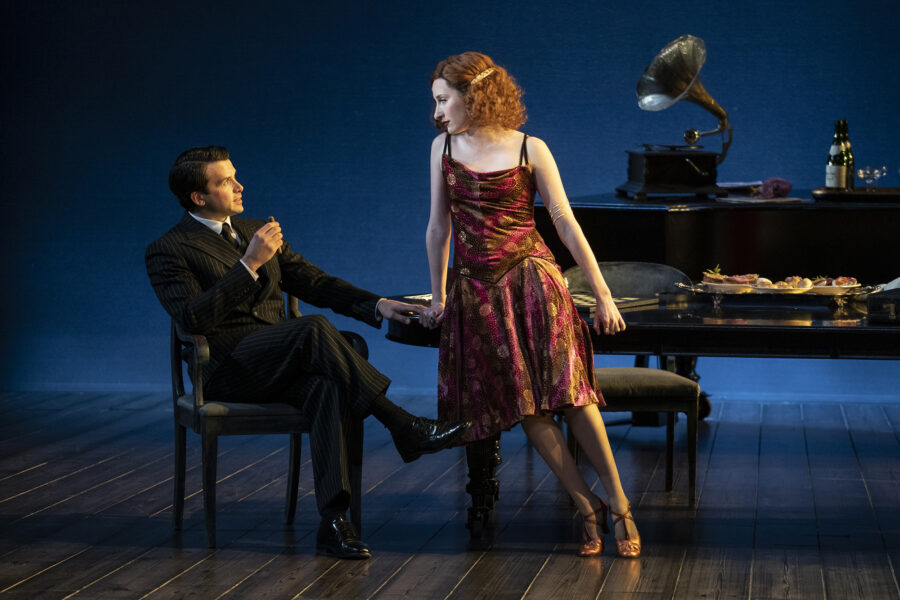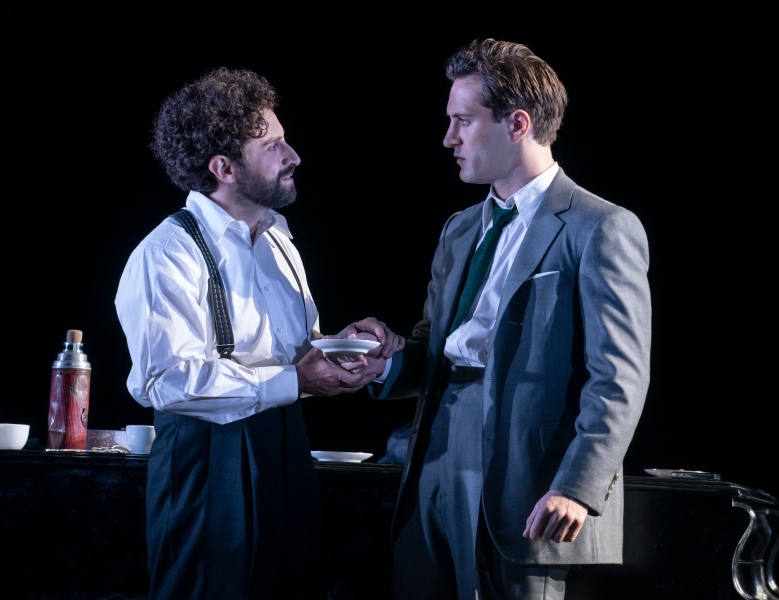The cast list to Tom Stoppard’s latest work, Leopoldstadt, is certainly intimidating. Multiple generations of a Jewish Viennese family, played by a small army of actors, sprawl across two pages. “How will I ever keep all these characters straight,?” I mused as scanned the program. Yes, the relationships and plotlines are incredibly intricate and difficult to follow, but that doesn’t matter. Stoppard, one of the greatest playwrights of the English-speaking theater, creates a narrative so powerful, intimate and touching that it’s okay if you don’t remember who is related or married to whom. In two intermissionless hours, Stoppard and director Patrick Marber take us on a harrowing journey from 1899 to 1955, paralleling the author’s own history of fleeing Hitler as a child, having the good fortune of his widowed mother marrying an Englishman, and then growing up in Great Britain. Stoppard, who was born in the Czech Republic, became more British than the Brits and had little connection with his Jewish heritage.
That is until he reconnected with distant relatives, chronicled in Hermione Lee’s excellent biography. Leopoldstadt, named for the Jewish Ghetto section of the Austrian capital, is the dramatic result of Stoppard’s examination of his roots. As he did with the emotionally intense The Real Thing, Stoppard proves he can do more than put together intellectual theatrical puzzles like Jumpers and Travesties. His broad historical canvas is vividly alive with sorrow and anguish.
The thread that weaves through the decades-long story is the Merz family’s place in European society from grudging but limited acceptance to the horrors of the Holocaust to its traumatic after effects. When we first meet the expansive Merz clan, they are ironically celebrating a secular Christmas just as the 19th century is ending. Several members have converted or married Catholics, thinking this assimilation will protect them from Gentile discrimination. Richard Hudson’s elegant set and Brigitte Reifenstuel’s detailed costumes recreate the various periods with subtle suggestiveness. As the years fly by and the German dictator rises to power, the family’s apartment becomes sparer and dingier as economic and social restrictions against Jews increase.

Credit: Joan Marcus
Marber’s smooth direction perfectly balances Stoppard’s comic moments (such as a farcical scene about circumcision) with the terrifying (a Gestapo official addressing the family like animals as he cruelly delivers orders for their relocation to the titular ghetto.) It’s difficult to single out any one of the large, outstanding ensemble which is so seamlessly integrated that no single performance stands out. Many play double roles and blend into the characters so effortlessly that it’s difficult to believe it’s the same actor.

Credit: Joan Marcus
Brandon Uranowitz is delightfully distracted as an absent-minded mathematician and devastatingly bitter as one of the few Merz survivors of the Nazi terrors. Seth Numrich captures the alienation of a maimed World War I vet and the compassion of a British journalist who marries into the family. Faye Castelow resembles a young Billie Burke as Gretl, a flighty wife whose indiscretions almost cause catastrophic scandal. David Krumholtz is brilliantly controlled as Gretl’s husband Hermann as he musters as much dignity as he can against the haughty bigotry of a smug officer who is Gretl’s secret lover (bristlingly nasty Arty Froushan). In a crafty piece of double casting, Froushan also plays Leo, the Stoppard stand-in, at first oblivious to his family’s destruction and then wracked with guilt by it. There’s also valuable contributions from Jenna Augen’s flinty Rosa who escapes to America, Aaron Neil’s practical and stoic Ernst, Tedra Millan’s brave resistance worker Nellie, Eden Epstein’s bubbly Hermine whose marriage to a Gentile banker (attractive Japheth Balaban) doesn’t save her from deportation to the camps; and Corey Brill’s barbaric Nazi.
Leopoldstadt is not just a career-capping work to Stoppard’s stunning oeuvre, ranking with Rosencrantz and Guildenstern Are Dead, Jumpers, The Real Thing, and The Coast of Utopia, but it’s essential viewing for all lovers of theater, history and humanity.
